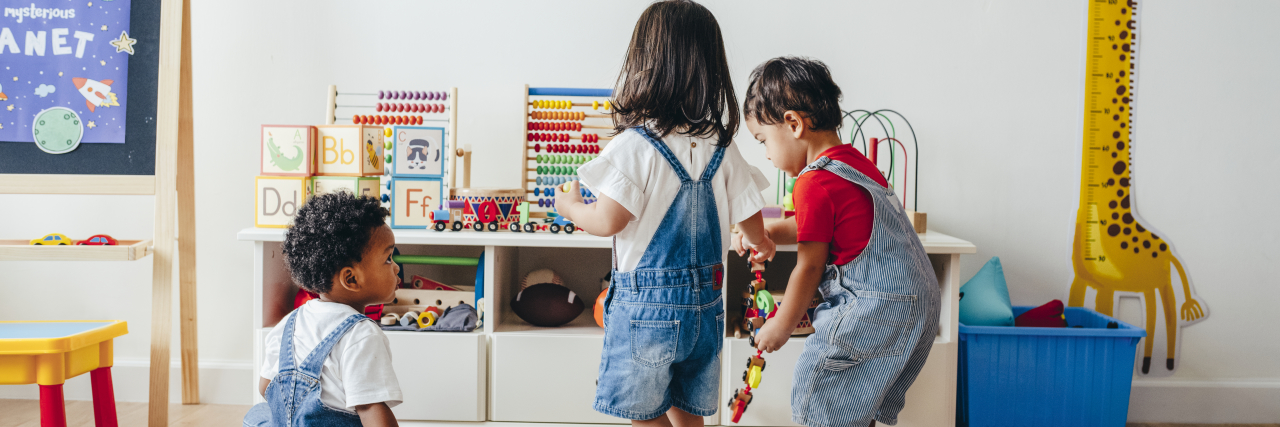To the Person Who Googled 'Should I Let My Kid Play With an Autistic Child?'
To the person who googled, “Should I let my kid play with an autistic child?”
Absolutely! I’m so glad you asked. Encouraging your child to play with others who have a variety of abilities and different interests from their own can have incredible benefits.
However, I’m guessing you googled this not so you could learn about the benefits of playing with an autistic child, but instead to search for the potentially harmful effects. I’m guessing you are afraid your child will learn new behaviors that are perceived as negative by others. I’m also guessing you’re worried your child will notice their peer’s differences and you won’t know how to answer their questions.
Please don’t avoid this playdate. Jump in. Model inclusion. Here is what you might see and what your child is likely to learn:
1. We all have different interests.
Everyone has interests, but some children have a really strong interest about one or two things. When your child is allowed to organically discover this through play, they will learn about neurodiversity without even knowing it. They may ask you, “Why does Johnny only like to play with trains? He doesn’t like my ideas.” You could coach your child by saying, “Johnny loves trains more than any other toy he has found so far. Sometimes he loves trains so much that his brain gets stuck on only playing with trains. Your brain likes playing with lots of different things. How about playing trains with Johnny for a little bit and then see if he’ll join you with your idea?”
2. Our bodies express emotions differently.
Some autistic children demonstrate stimming behaviors at times as a result of sensory overload in their nervous system. These repetitive body movements may look like a child flapping their arms or hands when they are very excited. If your child notices and asks about this, it’s a great opportunity to explain: “Susie’s body has lots of feelings that are sometimes just too much for her little body to handle. You know how you jump up and down when you get excited? Well, Susie flaps her hands when she’s excited.”
3. We all play with toys in a different way.
A playmate on the autism spectrum may line up cars instead of driving them around saying “vroom!” Sometimes this is because they haven’t learned to drive cars around yet due to a weakness in imitating what they see around them. Sometimes children play with toys in this repetitive way because they are stressed by the situation. Anxiety varies greatly from child to child so it’s best to ask the child’s parent if it’s OK for your child to join in during any repetitive play. For instance, if Johnny is lining up cars, it may cause him stress for a peer to join in and disrupt his plan. The child’s parent will know, so be friendly and ask if it’s OK for your child to join in.
4. Not everyone needs words to communicate.
Young children will notice if their playmate is not responding verbally to them. Your child may say, “Why doesn’t Susie answer my questions?” or, “Why doesn’t she look at me when we are playing?” This is a golden opportunity to teach your child that words are not the only way we communicate! You can say, “You have learned to talk to let people know your ideas, but Susie is still learning how to use her words. She can show people what she wants, sometimes she uses sign language, and you can also notice what she’s doing to figure out what she likes. Everyone learns to talk at different times and Susie is still working on it.”
5. We all have different sizes of feelings.
Meltdowns may happen more often for the autistic child than for your child, but again, this is an opportunity to teach your child that we all have different sizes of feelings and one thing that doesn’t upset your child may really upset another child. You can coach your child by saying, “Johnny has really big feelings when it’s time to leave the park. You know how disappointing it can feel for playtime to be over. He’s still learning to calm his body down when he’s really upset.”
You might still be concerned and wonder, “Will my child learn to copy negative behaviors?” This is often the main fear for parents of neurotypical children. As long as you acknowledge the differences in skills and help your child understand they have the skills to use their words and handle transitions, your child will see these differences and likely offer compassion instead of trying to mimic their peer.
Here’s the bottom line — we often don’t know who our children are going to get along with until we try. If your child wants to play, let them play! Some of these playdates will go well and some of them won’t. Either way, your child will likely learn valuable lessons about neurodiversity, inclusion and compassion. And just by showing up and trying, you are modeling compassion and inclusion, which is a feeling the parent of that autistic child will never forget.
– Dr. Emily, Advocating for Every Child
Photo credit: Rawpixel/Getty Images

